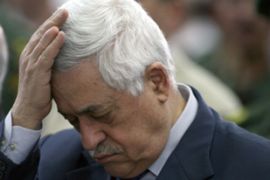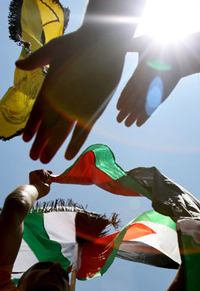Eye on Middle East peace meetings
Quartet and Arab mediators prepare for talks as Abbas sacks ex-Gaza security chief.

A day after Abbas is scheduled to meet Olmert, representatives of the Quartet of Middle East peacemakers are due to hold talks in occupied Jerusalem for the first time since Hamas seized control of the Gaza Strip, UN and Israeli officials said.
Such meetings among envoys are not uncommon but it is unusual for them to meet in Jerusalem.
Officer dismissed
Meanwhile, Abbas has dismissed a senior security officer who commanded the forces that were overrun by Hamas in Gaza last week, officials said.
Abbas issued a decree on Friday firing Rashid Abu Shbak, the head of internal security and a leader in the secular Fatah movement, saying he “is stripped of his tasks as general director”.
 |
| Palestinians in the West Bank have rallied in support of Fatah [AFP] |
Abbas issued two other decrees to further consolidate his control over the occupied West Bank where Fatah holds sway over Hamas, the group that now controls Gaza.
One of the decrees dissolved a national security council, effectively preventing Hamas, which has rejected Abbas’s emergency government, from having any role.
Furthermore, in a sign that he may shut down Hamas-affiliated groups in the West Bank, Abbas authorised the government to review all private organisations.
The decree asked the interior minister to review the legal status of all non-governmental organisations, or NGOs. It also gave these groups a week to reregister.
Fatah continues to hold sway in the Israeli-occupied West Bank, but some question whether Abbas remains strong enough to engage in peace talks with Israel.
Hamas claim
Hamas, which refuses to recognise Israel, remains in charge in Gaza and says it, not Abbas’s emergency cabinet, is the legitimate government.
Ismail Haniya, the deposed prime minister and leader of Hamas, says Fatah will not be able to exclude Hamas when determining the future of the Palestinian people.
“There is a big force that nobody can wipe out,” Haniya said in his weekly Friday sermon, referring to Hamas.
Israeli views
Benjamin Ben-Eliezer, infrastructure minister in Olmert’s cabinet, said it was too soon to discuss a revival of peace negotiations for a Palestinian state last convened in 2001.
| Your Views |
”The Israelis are tired of war, the Palestinians are tired of war” Send us your views If you are in the Gaza Strip, you can also mail your opinions to:Gazacrisis@aljazeera.net |
“I don’t even dream of seeing a peace process very soon,” he told Israel‘s Army Radio. “I only dream about seeing some quiet.”
“The real nuclear bomb is there and not in Iran,” he said, referring to the threat of continued Hamas control over Gaza.
Ran Cohen, an Israeli politician, said weapons alone would not ensure Abbas’ political survival in the West Bank.
He said: “Unless [Abbas] comes up with a political solution for the Palestinian people, the extremists will defeat him in the end.”
Saeb Erekat, a veteran Palestinian peace negotiator, said in anticipation of the talks that it was “most important we revive a meaningful peace process” that leads to a two-state solution to the Israeli-Palestinian conflict.
Crisis warning
Also on Friday, the Israeli army allowed seven trucks of medical supplies, milk and animal feed into the Gaza Strip.
Israel had begun on Wednesday allowing supplies to enter the coastal territory after the UN warned that a “serious humanitarian crisis” would develop if crossings that had been closed during the Fatah-Hamas fighting were not opened.
Aid agencies said food stocks could run out in two weeks, unless Israel‘s cargo blockade eased further.
Goods are currently only able to trickle through Kerem Shalom crossing, whose capacity is 15 trucks a day, and it was vital to reopen Karni crossing, which can handle up to 200 trucks a day, they said.
Unicef is assisting in the supply of fuel to run water and sanitation systems for 300,000 people.